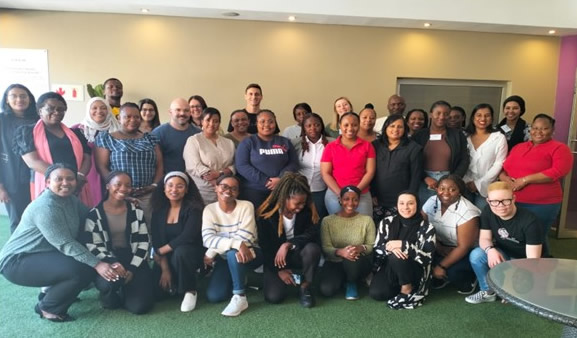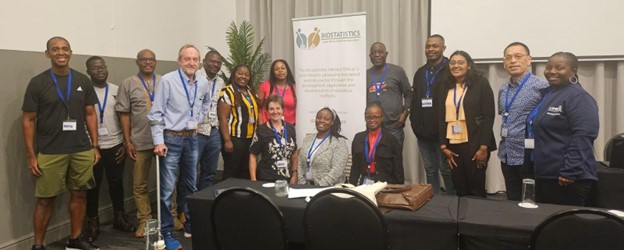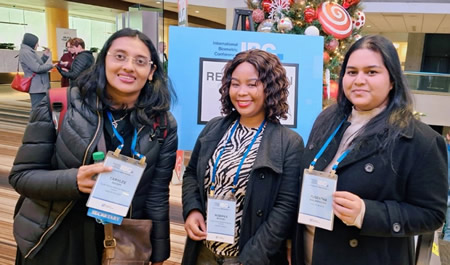The aim of Biostatistics Research Unit (BRU) is to enhance biostatistical research and to foster collaborations among researchers, clinicians and biostatisticians within the broad SAMRC network by providing the following collaborative services
- Providing input into the design of protocols, questionnaires and data capture, statistical analyses, statistical reporting and statistical review of reports and manuscripts.
- Appropriate power calculations for health surveys and clinical trials, balancing health, clinical and biological limitations, cost and resource limitations while maintaining statistical power and efficiency.
- Biostatistical methodology developments to enhance the inference of collaborative projects, work that frequently forms the basis for post-graduate studies and first-authored publications.
- Capacity development through postgraduate supervision in biostatistical and biomedical areas, and conduction of short courses and specialised workshops at the SAMRC and at various universities across South Africa.
The Biostatistics Research Unit's research and support are closely aligned with the priorities in the research agenda of the SAMRC, and therefore statistical inference in Public Health and Clinical Research form the basis of its work.
Additionally, the BRU staff have strong training in methodology, applied as well as experience in applications and collaborative research work. This, allows us to conduct own research relevant to a myriad of health and biomedical problems.
Specific areas of expertise and interest include:
- Sample survey sampling and analysis
- Mixture model and latent variable modelling
- The design, interim analysis and monitoring and analysis of individual and cluster randomised controlled trials.
- Spatial statistics and statistical epidemiology,
- Survival and longitudinal data analysis including joint modelling and multiple and recurrent events data.
- Handling of missing data in various models and analyses
Additionally, the Biostatistics Research Unit (BRU) provides data encoding service using various databases forms to ensure the highest level of data quality. Our data encoders are available to do data encoding from questionnaires or data forms into various databases. They work closely with the biostatisticians and in collaboration will accept incoming data.
Data encoder to contact:
| Cape Town | Amanda Fourie | amanda.fourie@mrc.ac.za | +27 21 9380920 |
| Durban | Thabisile Mvuyana | thabisile.mvuyana@mrc.ac.za | +27 31 2034820 |
BRU provides the input into the design of studies, questionnaire designs and data capturing, statistical analyses, statistical reporting and statistical review of reports and manuscripts.
For Statistical Support services contact the Unit Director Dr Tarylee Reddy at : Email : Tarylee.Reddy@mrc.ac.za or Tel : +27 31 203 4860
All projects supported by the BRU should have formal ethical approval from a recognized national or international institution in prior to engagement by any staff member of the Unit.
Research projects funded from the SAMRC baseline budget are supported free of charge whereas research funded by Non-SAMRC sources are supported on a fee for service basis. In this regard a formal quotation is provided and signed for the work to be done.
Thinking about a career in Biostatistics?- You will find some interesting information on our flyer.
The BRU staff are also involved in capacity development through conduction of short courses and workshops at the SAMRC and universities in South Africa. In particular, statistical workshops are conducted to cater for the specific needs of a health related organisation.
Courses presented by the BRU: The Introduction to Biostatistics course will be offered regularly in the different regions.
Events
BRU and GHRU host ‘Intro to Biostatistics’ short course
The Biostatistics Research Unit and the Gender and Health Research Unit successfully hosted a 3-day Introduction to Biostatistics short course from September 2–5, 2024, in Pretoria. The course was attended by 29 students, at Master’s and PhD level, together with health researchers, from both the SAMRC and external institutions.
The course covered essential statistical principles and concepts, using R and STATA to explore topics such as data management, study designs in medical research, as well as descriptive and inferential statistics.
Seven staff members from the Biostatistics Unit and the Gender and Health Research Unit facilitated the course, providing an engaging and informative learning experience. This course was funded by the Bill & Melinda Gates Foundation and the SAMRC, with 15 scholarships awarded. The remaining participants were self-funded.

The short course was well-received, giving participants greater confidence to tackle their research projects. More courses will be rolled out in 2025. Stay tuned for more updates!
The Biostatistics Research Unit participates in SASA conference : 18 – 22 November 2024
The Biostatistics Research Unit recently participated in the 65th Annual Conference of the South African Statistical Association (SASA), which took place from November 18-22, 2024, in Stellenbosch. The conference attracted statisticians and data scientists from across South Africa and beyond. A significant highlight was that four of our team members delivered presentations, showcasing their contributions to innovative statistical methodologies and applications.
Presentations covered a wide range of topics, including the use of structural equation modelling to investigate the impact of environmental shocks on intimate partner violence, an analysis of the bidirectional pathway between intimate partner violence and depression based on data from a cluster randomized trial, and novel methods for detecting epidemic waves. Another presentation explored the impact of clustering in randomized clinical trials by comparing different statistical approaches. In addition, one of our team members focused on joint modelling techniques for the analysis of longitudinal and interval censored survival data. These presentations highlighted the depth of our team’s expertise and our commitment to addressing complex biological/health related questions using advanced statistical methods.
Participants also enjoyed networking opportunities and workshops that explored the latest trends in computational statistics, data science, NRF Grant writing and rating applications, and biostatistics. This enriching experience not only showcased our team’s knowledge but also reaffirmed our dedication to tackling critical challenges in the field of statistics.

BRU staff participate in 32nd International Biometric Conference : 8 – 13 December 2024
Prof Tarylee Reddy (Unit Director) and Dr’s Yusentha Balakrishna and Nobuhle Mchunu (Senior Statisticians), from the Biostatistics Research Unit (BRU) attended The International Biometric Conference (IBC) in Atlanta, USA, from 8 - 13 December 2024, which brought together a diverse community of researchers and enthusiasts. The conference serves as a vibrant platform for statisticians, mathematicians, biological scientists, and interdisciplinary researchers from across the globe to advance the application and understanding of biosciences.
During the conference, Dr Balakrishna presented on "Identifying Food Groups using Multivariate Gaussian Mixture Model Clustering," while Dr Mchunu discussed "Personalized screening intervals for clinical biomarkers using extended joint models," both receiving positive feedback and interest in future international collaborations with like-minded statisticians. Prof Reddy hosted the "Women in Statistics Coffee Social," where discussions focused on work-life balance, career advancement, and uplifting women in the field, offering support for leadership roles. She was an invited speaker in the session “Statistical Methods and Considerations in the Design and Analysis of Vaccine Clinical Trials”.
A highlight of the conference was the Statistics in Practice Showcase, which explored variable selection and model-building challenges. Sessions on longitudinal data analysis and joint modelling further aligned with attendees' research. The conference provided valuable networking opportunities, enhancing collaboration and expanding perspectives in biosciences.

